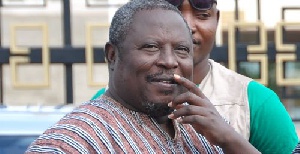Former Minister of Justice and Attorney General, Martin A.B. Amidu, has warned that the Special Prosecutor’s bill currently before Parliament will lack the power to fight corruption if passed to become law.
Consequently, he advised President Nana Addo Dankwa Akufo-Addo to be careful of some elements in his government whose intentions are to embarrass him in his fight against corruption.
He alleged that the President was being set up to be embarrassed by some faceless persons who clandestinely introduced some clauses into the special prosecutor’s bill to limit the prosecutor from investigating certain kinds of corruption and also removing corruption from the jurisdiction of the Economic and Organised Crime Office (EOCO).
This was the view of Martin Amidu in his latest statement issued to the media yesterday in Accra.
According to him, clauses, which were not part of the original bill, have been introduced by “men and women who might have warmed their way into public office by deceiving the President about their credentials of integrity and honour to render loyal service to him and the Republic of Ghana.”
Martin Amidu said Clause 3(4) which was also not part of the original draft of the Bill, negates the whole promise that the President made during his campaign and after his assumption of office to fight corruption.
“It states the Special Prosecutor is not to investigate and prosecute corruption offences relating to the Public Procurement Act, 2003 and the Criminal Offences Act, 1960 “….specified under paragraphs (a),(b) and (c) of subsection (1) unless the commission of the offence is in respect of a vast quantity of assets that (a) constitute a substantial proportion of the resources of the country; (b) threaten the political stability of the country; or (c) threaten the sustainable development of the country.”
The celebrated anti-corruption crusader noted that this clause was vague and a clear attempt to limit the powers of the special prosecutor.
“The attempt to distinguish the types of corruption offences that may be investigated and prosecuted by the Special Prosecutor sends the clear message to Ghanaians that the President and his government now accept certain types of corruption offences as not serious for prosecution, or at least to be prosecuted by the Special Prosecutor,” he said.
“I have no doubt that the insertion of Clause 3(4) that negates the whole Bill before Parliament was done to enable those proponents to harvest their shameless perceived share of the proceeds of corruption that dishonest appointees criminally exploit in public office.”
He, therefore, called on President Akufo-Addo to closely monitor some of his perceived incorruptible appointees whom he said may have been responsible for smuggling the clause into the bill.
“..the consequential amendments in Clause 78 (1) also remove the offence of corruption from the jurisdiction of the Economic and Organised Crime Office when it states that: “The Economic and Organised Crime Office Act, 2010 (Act 804) is amended in section 74 by the deletion the words “corruption and bribery” in paragraph (a) of the definition of serious offence,” Martin Amidu said.
“Who then will investigate the species of corruption the government has removed from the Special Prosecutor’s functions by the inserting in Clause 3(4) of the Bill before Parliament,” he quizzed.
“The retention of sub-clause 4 of Clause 3 of the Bill makes it unnecessary to enact any Office of the Special Prosecutor Bill into law… Bribery and corruption is bribery and corruption. We cannot justify any form of corruption. The 1992 Constitution did not make any exception when it prohibited corruption and enjoined every citizen to fight corruption.
The exceptions in Clause 3(4) of the Bill are consequently unconstitutional. Somebody should have known or realised that those insertions would embarrass the President in the promises he made to Ghanaians to fight corruption and prevented their insertion in the Bill,” the statement concluded. Meanwhile, the Special Prosecutor Bill has been withdrawn from Parliament by government.
It is, however, not known if the bill will be relayed in the coming days. The Parliamentary, Constitutional and Legal Committee of Parliament last week rejected a request by government for the office of the Special Prosecutor’s Bill to be passed under a certificate of urgency.
The committee recommended the bill be taken through all the normal processes. The minority raised issues of constitutional breaches, stating the bill had not been gazetted when it was first laid on Tuesday, July 18.
President Akufo-Addo while campaigning for the position in 2016, announced that his government would create an office of a special public prosecutor to prosecute ‘certain’ corrupt cases in the public sector.
He said the office of the prosecutor would be created within six months in office if he won the election.
The Bill for the Zongo and Inner City development has also been withdrawn by government.
General News of Thursday, 27 July 2017
Source: todaygh.com













